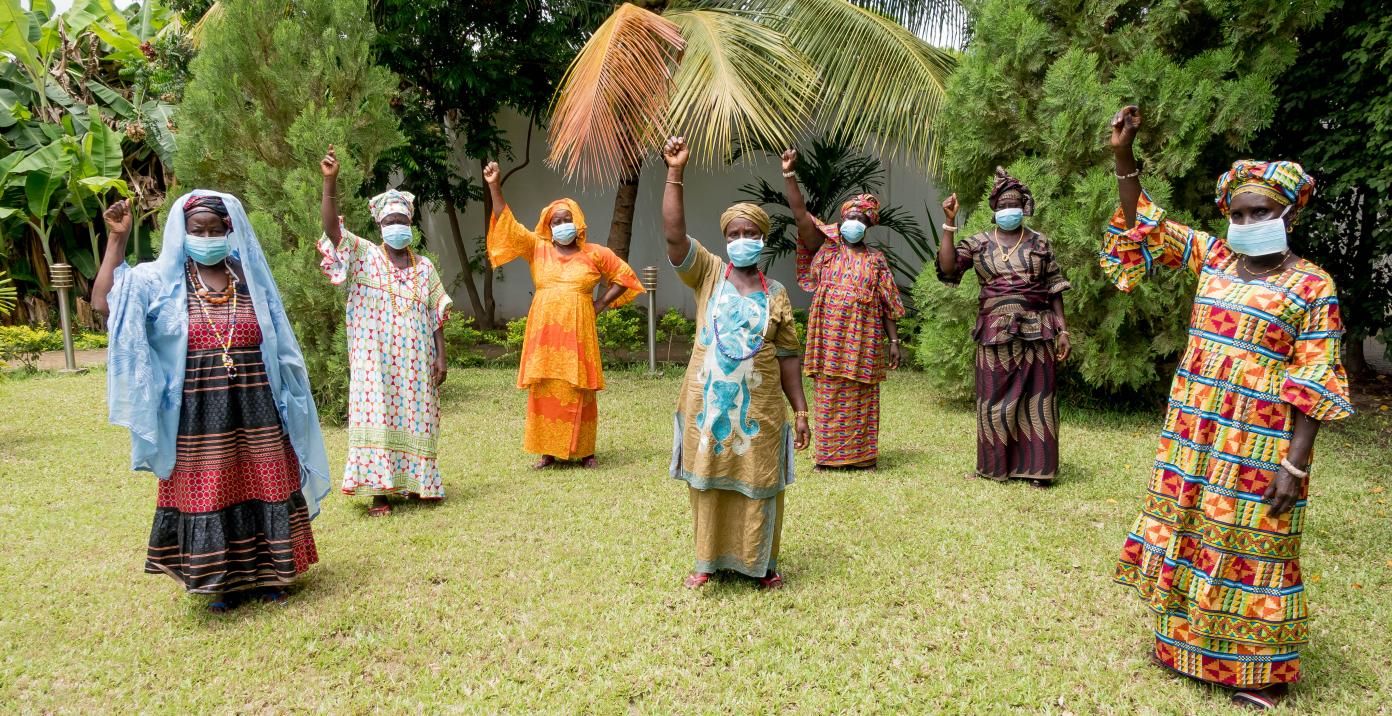Statement delivered by Asako Okai, UN Assistant Secretary-General & Director, UNDP Crisis Bureau
TriPartite Partnership to Support National Human Rights Institutions: Annual Review and Partnership Platform Meeting
October 5, 2021

Sensitization activities with a group of seven traditional communicators (also known as Griots) from the Wolof and Mandinka tribes, on the support services the NHRI of The Gambia is providing to women and victims of SGBV.
Dr. Al-Marri – Acting Chair of the Global Alliance of National Human Rights Institutions (Represented by Ameera Alhedfa, Special Advisor to the Chair of Global Alliance of National Human Rights Institutions); Ms. Ilze Brands-Kehris, Assistant Secretary-General of the UN Human Rights Office;
Colleagues and friends from National Human Rights Institutions and Regional Networks from around the world; dear colleagues from the UN system and broader development partners;
It is my pleasure to be here today and to open on behalf of UNDP, the Annual Review meeting of the TriPartite Partnership to support National Human Rights Institutions.
UNDP is pleased to facilitate this strategic opportunity for NHRIs to directly interact with the UN system. We also welcome the sharing of experiences and knowledge from the work of NHRIs on priority areas of support and engagement, as we plan jointly our priorities for the year ahead.
Distinguished participants,
I am pleased to inform you that UNDP‘s next 4 year Strategic Plan is just been endorsed by the Executive Board. Central to this Plan is ensuring just and equitable development for all. UNDP supports countries’ progress towards the 2030 Agenda and we foster greater coherence and complementarity among humanitarian, human rights and peace and security partners through our unique network of global reach and local presences in over 170 countries.
We are trying to look at the systems in place to deliver on the SDGs by taking a rights-based approach to empowerment, inclusion and to the multidimensional challenges of poverty and inequality.
Supporting national human rights systems is a critical part of this effort and National Human Rights Institutions are the cornerstones of these systems at country level, including in crisis settings. UNDP is proud to work in partnership with so many institutions around the world. In Bangladesh, UNDP supported the establishment of a digital complaints handling system. In Colombia, UNDP in coordination with the Ombudsman’s Office have facilitated social dialogues to facilitate the development of protocols for the prevention, early warning and investigation of threats toward human rights defenders. We will continue this work in our next Strategic Plan.
Distinguished Participants,
At the outset of the meeting, I would like to share three key takeaways from UNDP’s side:
Firstly, NHRIs are being increasingly recognized for their pivotal role on the front lines of multi-dimensional human rights and development challenges. Whether that is addressing the human rights implications of the COVID-19 pandemic; or asserting their monitoring role to provide rights-based advice to governments on implications of climate change; or acting as a bridge between populations often left behind and the state and increasingly the private sector when it comes to business and human rights. Supporting NHRIs as they face these contemporary human rights challenges will assist countries achieve sustainable development and sustain peace.
Secondly, the UN is ‘better together’ to support NHRIs. We have built important successes through the TriPartite Partnership including joint programming in 15 countries in the last 2 years and global research providing data and evidence on the COVID-19 pandemic and its human rights implications. The Secretary-General’s Call to Action framework reinforces this partnership approach, and as the system works to support efforts in key areas of the Call to Action, well-capacitated and functioning NHRIs are understood as critical partners at country level. We must remain committed to provide integrated and coherent support to national institutions. I am pleased to see a UN Partnership Platform to discuss this support as part of the meeting tomorrow.
Lastly, NHRIs are faced with increasingly different and nuanced forms of reprisals for carrying out their mandated activities. This can affect how they function and, in some cases the personal safety of staff. This is unfortunately a trend in many areas of the work of human rights defenders, and it is not acceptable. Post-UN reform, we need to discuss practical approaches of how the UN can support NHRIs under threat. It is important to promote and defend mandated activities of NHRIs which are essential for peaceful, just and inclusive societies.
Distinguished participants,
I would like to take this opportunity to acknowledge and thank our partners who we work hand in hand with: the Global Alliance of National Human Rights Institutions and the UN Human Rights Office. Together we bring the development and human rights pillars of the UN system to the service of national human rights institutions in all development settings. This integrated approach allows us to take the systems approach needed to support NHRIs and their work. We are grateful for our continued partnership and the progress we are making together.
I am pleased to open this meeting on this forward-looking note and I look forward to learning about the concrete recommendations and conclusions reached in your discussions.
Thank you.

 Locations
Locations